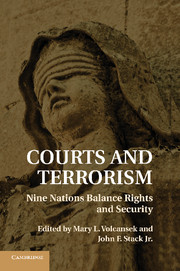Book contents
- Frontmatter
- Contents
- Contributors
- COURTS AND TERRORISM
- Introduction
- 1 Detentions and Security versus Liberty in Times of National Emergency
- 2 One More Casualty of the “War on Terror”
- 3 State Secrets and Democratic Values
- 4 What Lessons Can Be Drawn from a Sui Generis Case? The Global “War on Terror” and Northern Ireland
- 5 The British Experience with Terrorism: From the IRA to Al Qaeda
- 6 Detention and Treatment of Suspected Terrorists under the European Convention on Human Rights
- 7 Australia's Commonwealth Model and Terrorism
- 8 Judicial Rejection as Substantial Relief: The Israeli Supreme Court and the “War on Terror”
- 9 Preserving Rights and Protecting the Public: The Italian Experience
- 10 Squaring the Circle? Fighting Terror while Consolidating Democracy in Spain
- 11 From Exception to Normalcy: Law, the Judiciary, Civil Rights, and Terrorism in Colombia, 1984–2004
- Conclusion: Lessons Learned
- Cases Cited
- Statutes Cited
- References
- Index
8 - Judicial Rejection as Substantial Relief: The Israeli Supreme Court and the “War on Terror”
Published online by Cambridge University Press: 05 July 2011
- Frontmatter
- Contents
- Contributors
- COURTS AND TERRORISM
- Introduction
- 1 Detentions and Security versus Liberty in Times of National Emergency
- 2 One More Casualty of the “War on Terror”
- 3 State Secrets and Democratic Values
- 4 What Lessons Can Be Drawn from a Sui Generis Case? The Global “War on Terror” and Northern Ireland
- 5 The British Experience with Terrorism: From the IRA to Al Qaeda
- 6 Detention and Treatment of Suspected Terrorists under the European Convention on Human Rights
- 7 Australia's Commonwealth Model and Terrorism
- 8 Judicial Rejection as Substantial Relief: The Israeli Supreme Court and the “War on Terror”
- 9 Preserving Rights and Protecting the Public: The Italian Experience
- 10 Squaring the Circle? Fighting Terror while Consolidating Democracy in Spain
- 11 From Exception to Normalcy: Law, the Judiciary, Civil Rights, and Terrorism in Colombia, 1984–2004
- Conclusion: Lessons Learned
- Cases Cited
- Statutes Cited
- References
- Index
Summary
In 1994 an unusual case of administrative detention came before the Israeli Supreme Court. During the preceding forty-six years the Court had reviewed dozens of detention orders. What made this case different from all others was the fact that the only legal ground for holding nine of the ten petitioners, all of them citizens of Lebanon, was that they were being used as “bargaining chips” for the release of an Israeli pilot, Ron Arad, believed to be held as a prisoner by a terrorist organization based on Lebanese soil. In 1997, the Court handed down its decision. Two justices who formed the majority of the panel decided that holding the prisoners for such purposes falls under the definition of “state security,” whereas the minority justice ruled that there are no grounds for such detentions if the detained prisoners pose no danger to state security. Three years later, in April 2000, the Court, sitting in an enlarged panel of nine justices (including the three justices who heard the 1997 petition), reversed its decision and ruled that the state has no right to hold the prisoners as a bargaining tool for the release of a captive Israeli soldier. The fifty pages of the Court's opinion bring to light the dilemmas faced by a democratic society wishing to secure bearable standards of human rights and dignity of persons, on the one hand, and at the same time fight terrorist organizations that abide only by their own internal operating rules.
- Type
- Chapter
- Information
- Courts and TerrorismNine Nations Balance Rights and Security, pp. 150 - 168Publisher: Cambridge University PressPrint publication year: 2010



